Digital Technology's Impact on Tesco's Business Operations
VerifiedAdded on 2020/07/23
|11
|2420
|29
Report
AI Summary
This research project investigates the influence of digital technology on the day-to-day business operations of Tesco, a leading supermarket and retail firm in London. The study explores the significance of digital technologies in enhancing various core business processes, including production, marketing, human resources, and supply chain management. It aims to identify the importance and applications of digital technology, analyze its impact on Tesco's operations, and examine the challenges faced during its implementation. The research employs an inductive approach, descriptive research design, and a quantitative strategy using questionnaires administered to Tesco managers. The literature review examines the meaning and impact of digital technologies on organizations, along with the challenges they pose, such as the need for expertise and cybersecurity threats. The methodology section outlines the research approach, design, strategy, data collection methods, sampling techniques, and data analysis procedures. The study aims to provide valuable insights for academics, researchers, and future studies on the effects of digital technology on business operations and provides a detailed timeline of research activities. The researcher plans to collect data from Tesco managers and analyze it using thematic analysis to address the research questions and achieve the stated objectives.
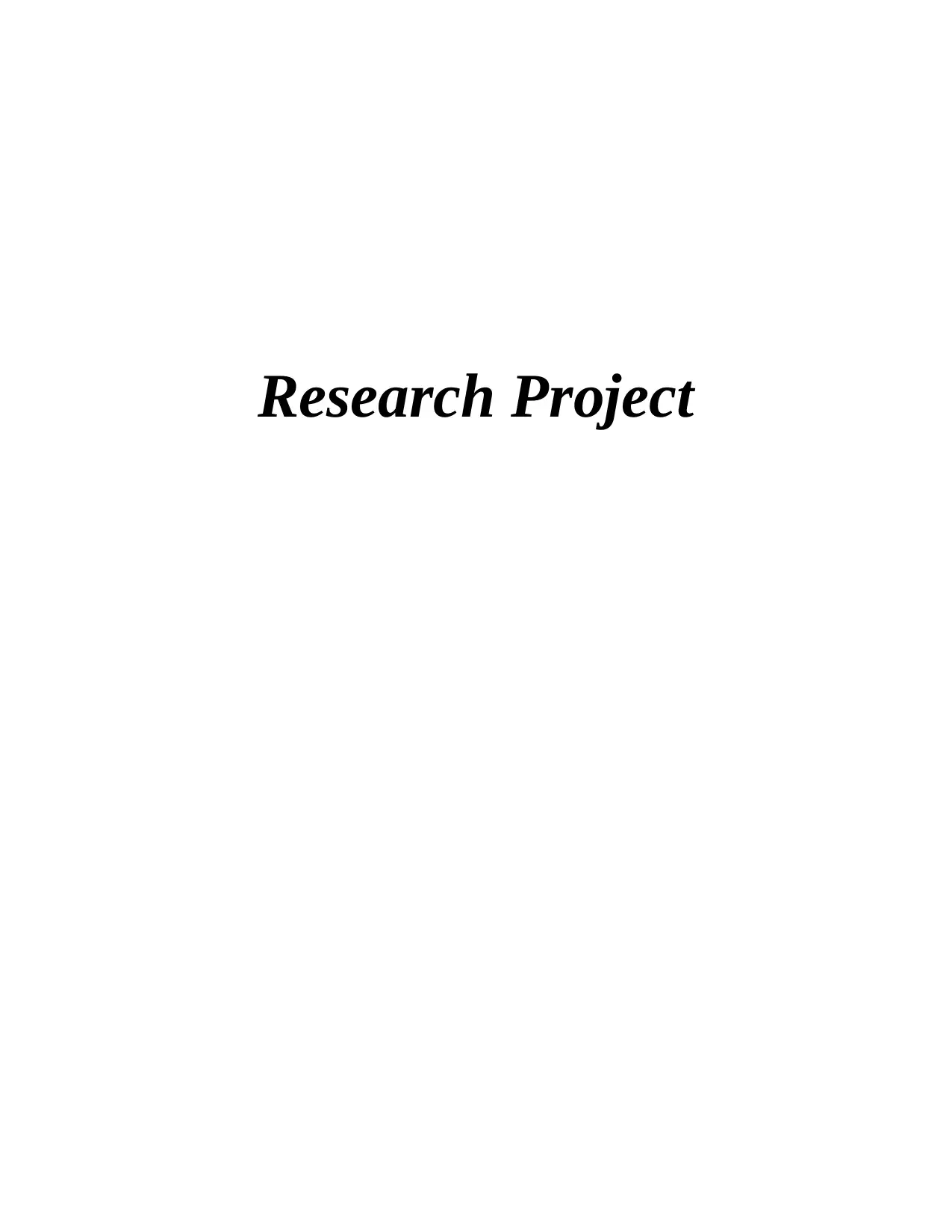
Research Project
Paraphrase This Document
Need a fresh take? Get an instant paraphrase of this document with our AI Paraphraser
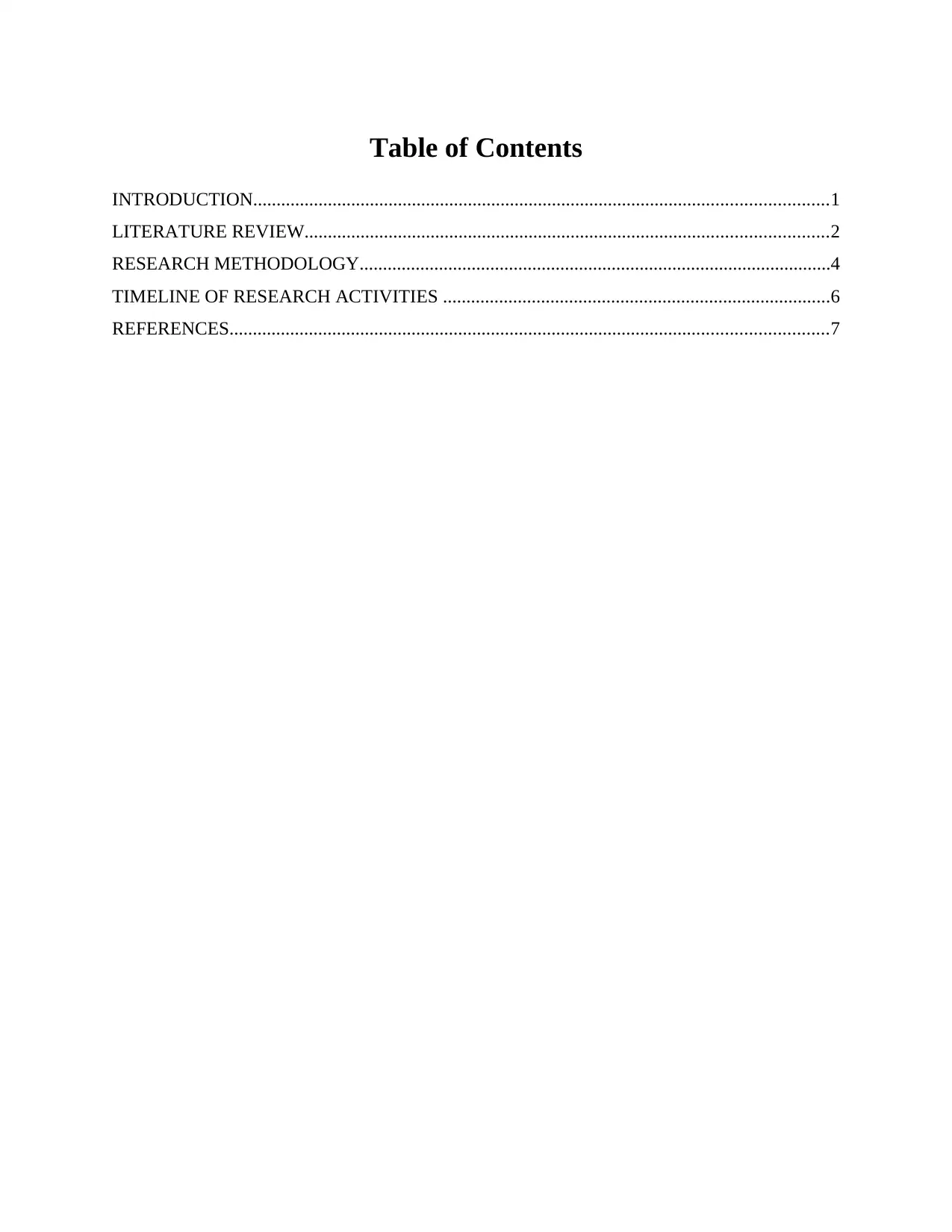
Table of Contents
INTRODUCTION...........................................................................................................................1
LITERATURE REVIEW................................................................................................................2
RESEARCH METHODOLOGY.....................................................................................................4
TIMELINE OF RESEARCH ACTIVITIES ...................................................................................6
REFERENCES................................................................................................................................7
INTRODUCTION...........................................................................................................................1
LITERATURE REVIEW................................................................................................................2
RESEARCH METHODOLOGY.....................................................................................................4
TIMELINE OF RESEARCH ACTIVITIES ...................................................................................6
REFERENCES................................................................................................................................7
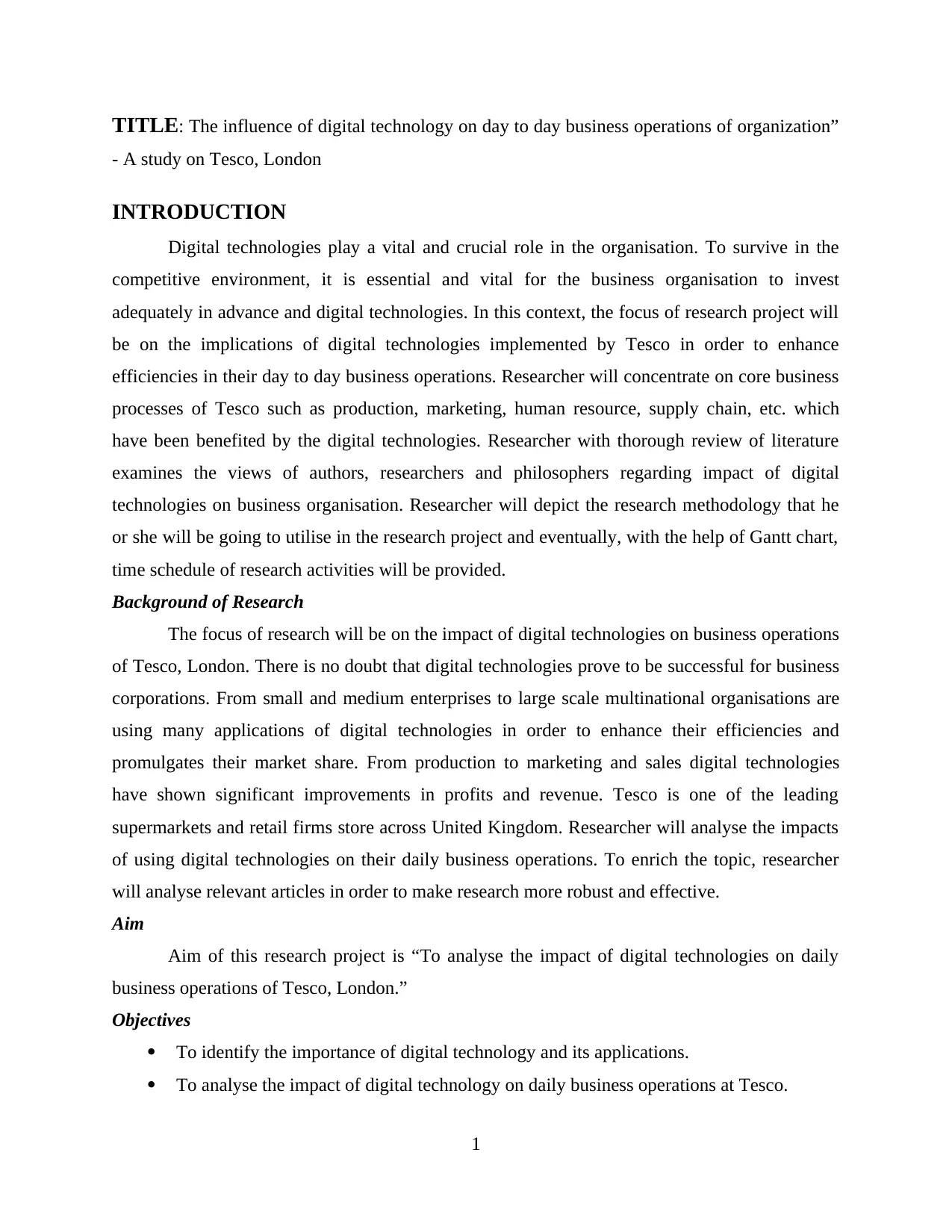
TITLE: The influence of digital technology on day to day business operations of organization”
- A study on Tesco, London
INTRODUCTION
Digital technologies play a vital and crucial role in the organisation. To survive in the
competitive environment, it is essential and vital for the business organisation to invest
adequately in advance and digital technologies. In this context, the focus of research project will
be on the implications of digital technologies implemented by Tesco in order to enhance
efficiencies in their day to day business operations. Researcher will concentrate on core business
processes of Tesco such as production, marketing, human resource, supply chain, etc. which
have been benefited by the digital technologies. Researcher with thorough review of literature
examines the views of authors, researchers and philosophers regarding impact of digital
technologies on business organisation. Researcher will depict the research methodology that he
or she will be going to utilise in the research project and eventually, with the help of Gantt chart,
time schedule of research activities will be provided.
Background of Research
The focus of research will be on the impact of digital technologies on business operations
of Tesco, London. There is no doubt that digital technologies prove to be successful for business
corporations. From small and medium enterprises to large scale multinational organisations are
using many applications of digital technologies in order to enhance their efficiencies and
promulgates their market share. From production to marketing and sales digital technologies
have shown significant improvements in profits and revenue. Tesco is one of the leading
supermarkets and retail firms store across United Kingdom. Researcher will analyse the impacts
of using digital technologies on their daily business operations. To enrich the topic, researcher
will analyse relevant articles in order to make research more robust and effective.
Aim
Aim of this research project is “To analyse the impact of digital technologies on daily
business operations of Tesco, London.”
Objectives
To identify the importance of digital technology and its applications.
To analyse the impact of digital technology on daily business operations at Tesco.
1
- A study on Tesco, London
INTRODUCTION
Digital technologies play a vital and crucial role in the organisation. To survive in the
competitive environment, it is essential and vital for the business organisation to invest
adequately in advance and digital technologies. In this context, the focus of research project will
be on the implications of digital technologies implemented by Tesco in order to enhance
efficiencies in their day to day business operations. Researcher will concentrate on core business
processes of Tesco such as production, marketing, human resource, supply chain, etc. which
have been benefited by the digital technologies. Researcher with thorough review of literature
examines the views of authors, researchers and philosophers regarding impact of digital
technologies on business organisation. Researcher will depict the research methodology that he
or she will be going to utilise in the research project and eventually, with the help of Gantt chart,
time schedule of research activities will be provided.
Background of Research
The focus of research will be on the impact of digital technologies on business operations
of Tesco, London. There is no doubt that digital technologies prove to be successful for business
corporations. From small and medium enterprises to large scale multinational organisations are
using many applications of digital technologies in order to enhance their efficiencies and
promulgates their market share. From production to marketing and sales digital technologies
have shown significant improvements in profits and revenue. Tesco is one of the leading
supermarkets and retail firms store across United Kingdom. Researcher will analyse the impacts
of using digital technologies on their daily business operations. To enrich the topic, researcher
will analyse relevant articles in order to make research more robust and effective.
Aim
Aim of this research project is “To analyse the impact of digital technologies on daily
business operations of Tesco, London.”
Objectives
To identify the importance of digital technology and its applications.
To analyse the impact of digital technology on daily business operations at Tesco.
1
⊘ This is a preview!⊘
Do you want full access?
Subscribe today to unlock all pages.

Trusted by 1+ million students worldwide
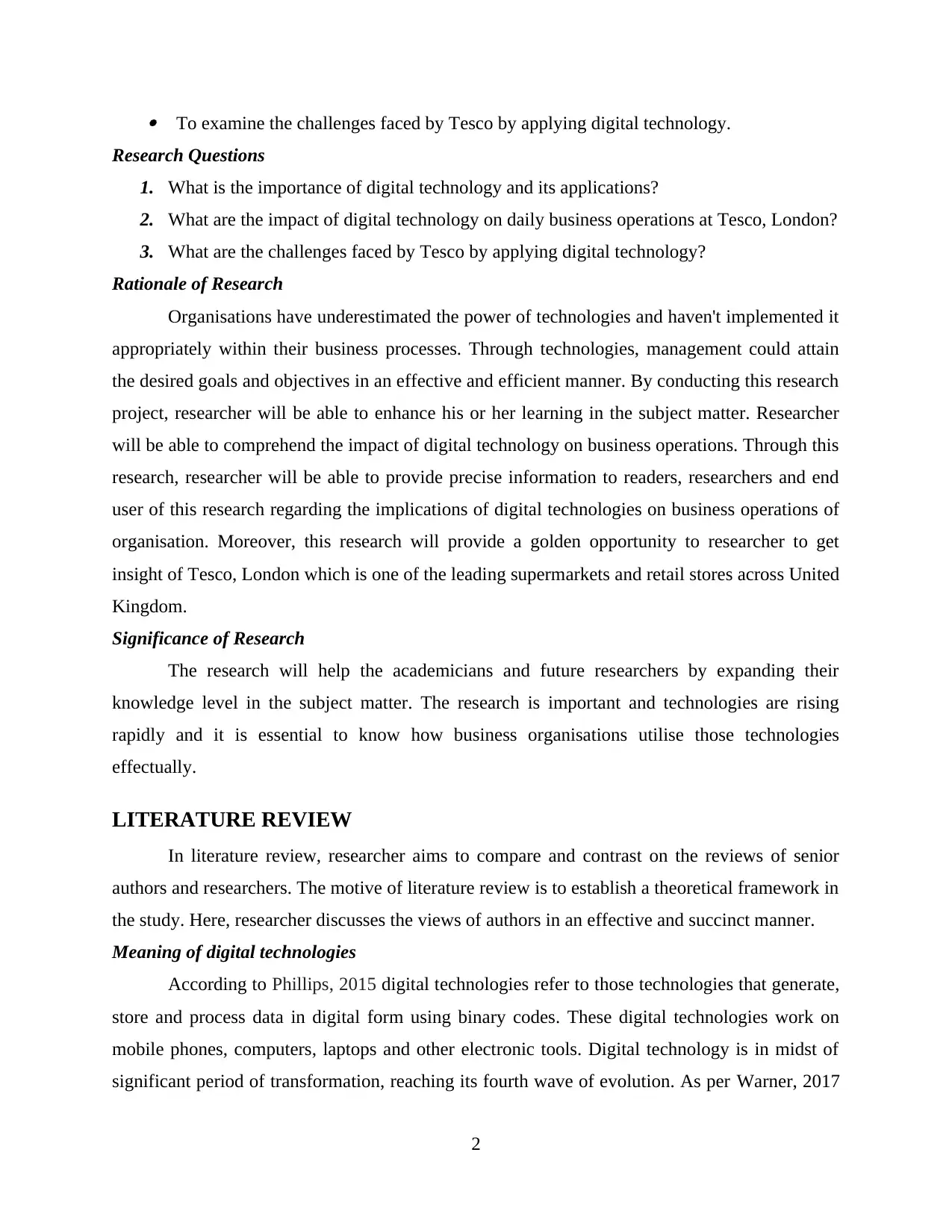
To examine the challenges faced by Tesco by applying digital technology.
Research Questions
1. What is the importance of digital technology and its applications?
2. What are the impact of digital technology on daily business operations at Tesco, London?
3. What are the challenges faced by Tesco by applying digital technology?
Rationale of Research
Organisations have underestimated the power of technologies and haven't implemented it
appropriately within their business processes. Through technologies, management could attain
the desired goals and objectives in an effective and efficient manner. By conducting this research
project, researcher will be able to enhance his or her learning in the subject matter. Researcher
will be able to comprehend the impact of digital technology on business operations. Through this
research, researcher will be able to provide precise information to readers, researchers and end
user of this research regarding the implications of digital technologies on business operations of
organisation. Moreover, this research will provide a golden opportunity to researcher to get
insight of Tesco, London which is one of the leading supermarkets and retail stores across United
Kingdom.
Significance of Research
The research will help the academicians and future researchers by expanding their
knowledge level in the subject matter. The research is important and technologies are rising
rapidly and it is essential to know how business organisations utilise those technologies
effectually.
LITERATURE REVIEW
In literature review, researcher aims to compare and contrast on the reviews of senior
authors and researchers. The motive of literature review is to establish a theoretical framework in
the study. Here, researcher discusses the views of authors in an effective and succinct manner.
Meaning of digital technologies
According to Phillips, 2015 digital technologies refer to those technologies that generate,
store and process data in digital form using binary codes. These digital technologies work on
mobile phones, computers, laptops and other electronic tools. Digital technology is in midst of
significant period of transformation, reaching its fourth wave of evolution. As per Warner, 2017
2
Research Questions
1. What is the importance of digital technology and its applications?
2. What are the impact of digital technology on daily business operations at Tesco, London?
3. What are the challenges faced by Tesco by applying digital technology?
Rationale of Research
Organisations have underestimated the power of technologies and haven't implemented it
appropriately within their business processes. Through technologies, management could attain
the desired goals and objectives in an effective and efficient manner. By conducting this research
project, researcher will be able to enhance his or her learning in the subject matter. Researcher
will be able to comprehend the impact of digital technology on business operations. Through this
research, researcher will be able to provide precise information to readers, researchers and end
user of this research regarding the implications of digital technologies on business operations of
organisation. Moreover, this research will provide a golden opportunity to researcher to get
insight of Tesco, London which is one of the leading supermarkets and retail stores across United
Kingdom.
Significance of Research
The research will help the academicians and future researchers by expanding their
knowledge level in the subject matter. The research is important and technologies are rising
rapidly and it is essential to know how business organisations utilise those technologies
effectually.
LITERATURE REVIEW
In literature review, researcher aims to compare and contrast on the reviews of senior
authors and researchers. The motive of literature review is to establish a theoretical framework in
the study. Here, researcher discusses the views of authors in an effective and succinct manner.
Meaning of digital technologies
According to Phillips, 2015 digital technologies refer to those technologies that generate,
store and process data in digital form using binary codes. These digital technologies work on
mobile phones, computers, laptops and other electronic tools. Digital technology is in midst of
significant period of transformation, reaching its fourth wave of evolution. As per Warner, 2017
2
Paraphrase This Document
Need a fresh take? Get an instant paraphrase of this document with our AI Paraphraser
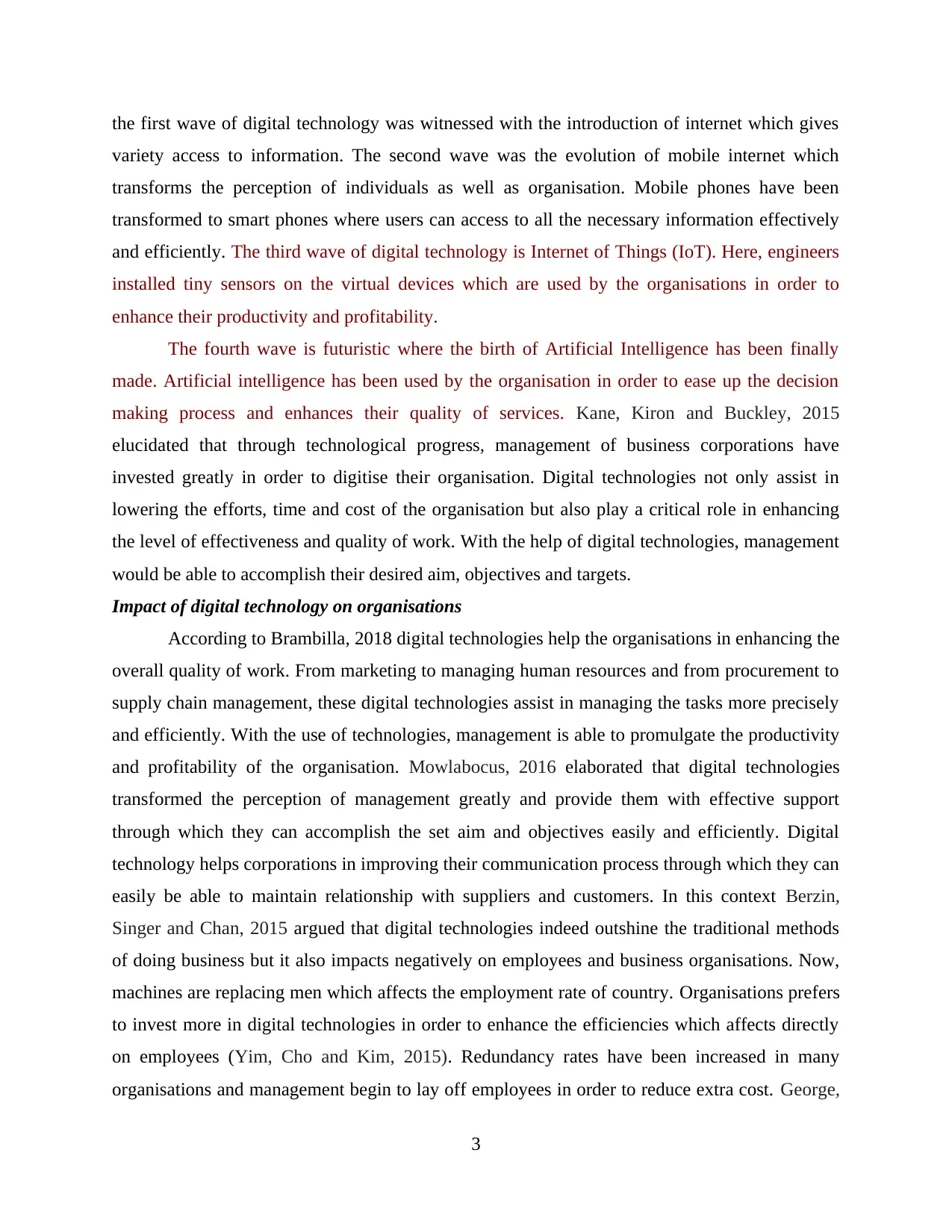
the first wave of digital technology was witnessed with the introduction of internet which gives
variety access to information. The second wave was the evolution of mobile internet which
transforms the perception of individuals as well as organisation. Mobile phones have been
transformed to smart phones where users can access to all the necessary information effectively
and efficiently. The third wave of digital technology is Internet of Things (IoT). Here, engineers
installed tiny sensors on the virtual devices which are used by the organisations in order to
enhance their productivity and profitability.
The fourth wave is futuristic where the birth of Artificial Intelligence has been finally
made. Artificial intelligence has been used by the organisation in order to ease up the decision
making process and enhances their quality of services. Kane, Kiron and Buckley, 2015
elucidated that through technological progress, management of business corporations have
invested greatly in order to digitise their organisation. Digital technologies not only assist in
lowering the efforts, time and cost of the organisation but also play a critical role in enhancing
the level of effectiveness and quality of work. With the help of digital technologies, management
would be able to accomplish their desired aim, objectives and targets.
Impact of digital technology on organisations
According to Brambilla, 2018 digital technologies help the organisations in enhancing the
overall quality of work. From marketing to managing human resources and from procurement to
supply chain management, these digital technologies assist in managing the tasks more precisely
and efficiently. With the use of technologies, management is able to promulgate the productivity
and profitability of the organisation. Mowlabocus, 2016 elaborated that digital technologies
transformed the perception of management greatly and provide them with effective support
through which they can accomplish the set aim and objectives easily and efficiently. Digital
technology helps corporations in improving their communication process through which they can
easily be able to maintain relationship with suppliers and customers. In this context Berzin,
Singer and Chan, 2015 argued that digital technologies indeed outshine the traditional methods
of doing business but it also impacts negatively on employees and business organisations. Now,
machines are replacing men which affects the employment rate of country. Organisations prefers
to invest more in digital technologies in order to enhance the efficiencies which affects directly
on employees (Yim, Cho and Kim, 2015). Redundancy rates have been increased in many
organisations and management begin to lay off employees in order to reduce extra cost. George,
3
variety access to information. The second wave was the evolution of mobile internet which
transforms the perception of individuals as well as organisation. Mobile phones have been
transformed to smart phones where users can access to all the necessary information effectively
and efficiently. The third wave of digital technology is Internet of Things (IoT). Here, engineers
installed tiny sensors on the virtual devices which are used by the organisations in order to
enhance their productivity and profitability.
The fourth wave is futuristic where the birth of Artificial Intelligence has been finally
made. Artificial intelligence has been used by the organisation in order to ease up the decision
making process and enhances their quality of services. Kane, Kiron and Buckley, 2015
elucidated that through technological progress, management of business corporations have
invested greatly in order to digitise their organisation. Digital technologies not only assist in
lowering the efforts, time and cost of the organisation but also play a critical role in enhancing
the level of effectiveness and quality of work. With the help of digital technologies, management
would be able to accomplish their desired aim, objectives and targets.
Impact of digital technology on organisations
According to Brambilla, 2018 digital technologies help the organisations in enhancing the
overall quality of work. From marketing to managing human resources and from procurement to
supply chain management, these digital technologies assist in managing the tasks more precisely
and efficiently. With the use of technologies, management is able to promulgate the productivity
and profitability of the organisation. Mowlabocus, 2016 elaborated that digital technologies
transformed the perception of management greatly and provide them with effective support
through which they can accomplish the set aim and objectives easily and efficiently. Digital
technology helps corporations in improving their communication process through which they can
easily be able to maintain relationship with suppliers and customers. In this context Berzin,
Singer and Chan, 2015 argued that digital technologies indeed outshine the traditional methods
of doing business but it also impacts negatively on employees and business organisations. Now,
machines are replacing men which affects the employment rate of country. Organisations prefers
to invest more in digital technologies in order to enhance the efficiencies which affects directly
on employees (Yim, Cho and Kim, 2015). Redundancy rates have been increased in many
organisations and management begin to lay off employees in order to reduce extra cost. George,
3
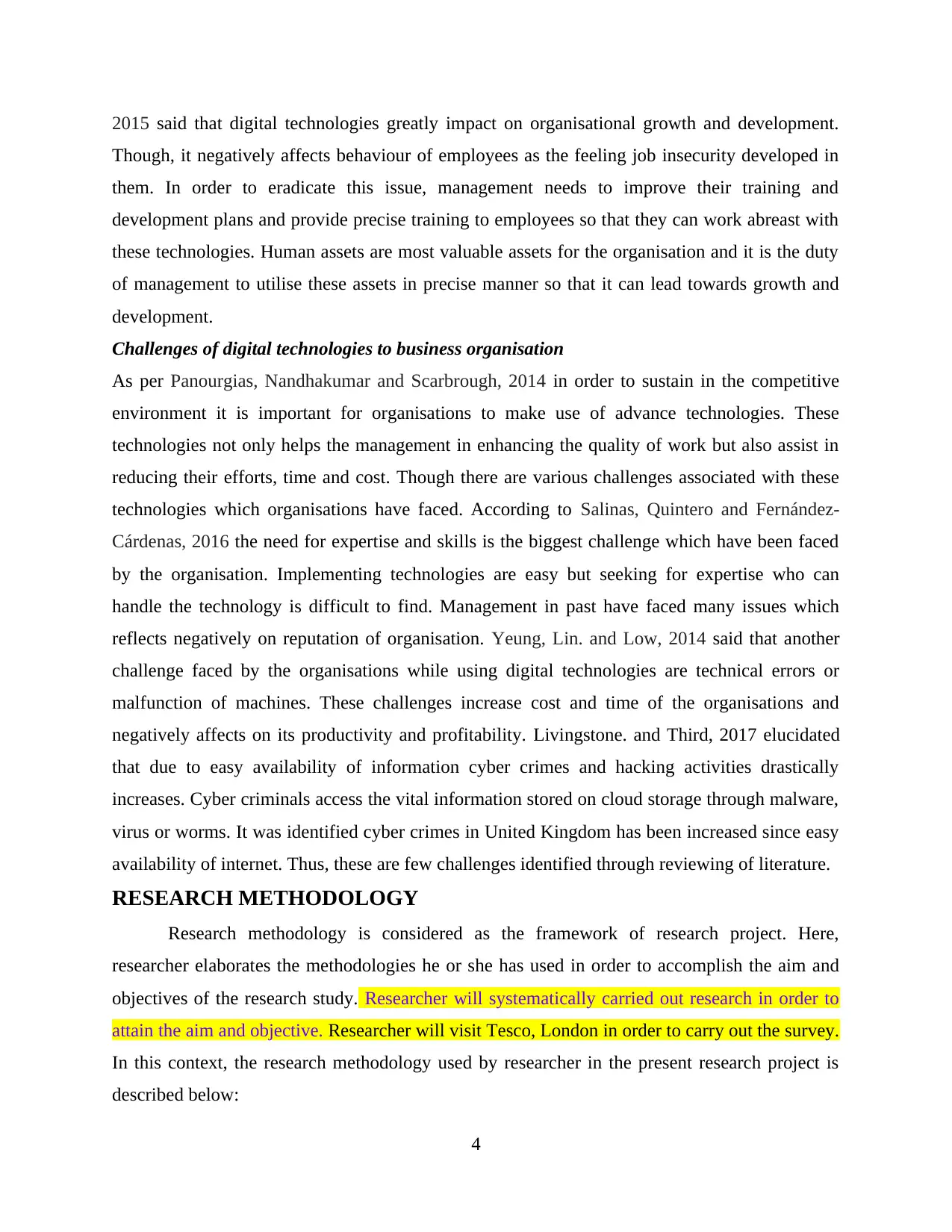
2015 said that digital technologies greatly impact on organisational growth and development.
Though, it negatively affects behaviour of employees as the feeling job insecurity developed in
them. In order to eradicate this issue, management needs to improve their training and
development plans and provide precise training to employees so that they can work abreast with
these technologies. Human assets are most valuable assets for the organisation and it is the duty
of management to utilise these assets in precise manner so that it can lead towards growth and
development.
Challenges of digital technologies to business organisation
As per Panourgias, Nandhakumar and Scarbrough, 2014 in order to sustain in the competitive
environment it is important for organisations to make use of advance technologies. These
technologies not only helps the management in enhancing the quality of work but also assist in
reducing their efforts, time and cost. Though there are various challenges associated with these
technologies which organisations have faced. According to Salinas, Quintero and Fernández-
Cárdenas, 2016 the need for expertise and skills is the biggest challenge which have been faced
by the organisation. Implementing technologies are easy but seeking for expertise who can
handle the technology is difficult to find. Management in past have faced many issues which
reflects negatively on reputation of organisation. Yeung, Lin. and Low, 2014 said that another
challenge faced by the organisations while using digital technologies are technical errors or
malfunction of machines. These challenges increase cost and time of the organisations and
negatively affects on its productivity and profitability. Livingstone. and Third, 2017 elucidated
that due to easy availability of information cyber crimes and hacking activities drastically
increases. Cyber criminals access the vital information stored on cloud storage through malware,
virus or worms. It was identified cyber crimes in United Kingdom has been increased since easy
availability of internet. Thus, these are few challenges identified through reviewing of literature.
RESEARCH METHODOLOGY
Research methodology is considered as the framework of research project. Here,
researcher elaborates the methodologies he or she has used in order to accomplish the aim and
objectives of the research study. Researcher will systematically carried out research in order to
attain the aim and objective. Researcher will visit Tesco, London in order to carry out the survey.
In this context, the research methodology used by researcher in the present research project is
described below:
4
Though, it negatively affects behaviour of employees as the feeling job insecurity developed in
them. In order to eradicate this issue, management needs to improve their training and
development plans and provide precise training to employees so that they can work abreast with
these technologies. Human assets are most valuable assets for the organisation and it is the duty
of management to utilise these assets in precise manner so that it can lead towards growth and
development.
Challenges of digital technologies to business organisation
As per Panourgias, Nandhakumar and Scarbrough, 2014 in order to sustain in the competitive
environment it is important for organisations to make use of advance technologies. These
technologies not only helps the management in enhancing the quality of work but also assist in
reducing their efforts, time and cost. Though there are various challenges associated with these
technologies which organisations have faced. According to Salinas, Quintero and Fernández-
Cárdenas, 2016 the need for expertise and skills is the biggest challenge which have been faced
by the organisation. Implementing technologies are easy but seeking for expertise who can
handle the technology is difficult to find. Management in past have faced many issues which
reflects negatively on reputation of organisation. Yeung, Lin. and Low, 2014 said that another
challenge faced by the organisations while using digital technologies are technical errors or
malfunction of machines. These challenges increase cost and time of the organisations and
negatively affects on its productivity and profitability. Livingstone. and Third, 2017 elucidated
that due to easy availability of information cyber crimes and hacking activities drastically
increases. Cyber criminals access the vital information stored on cloud storage through malware,
virus or worms. It was identified cyber crimes in United Kingdom has been increased since easy
availability of internet. Thus, these are few challenges identified through reviewing of literature.
RESEARCH METHODOLOGY
Research methodology is considered as the framework of research project. Here,
researcher elaborates the methodologies he or she has used in order to accomplish the aim and
objectives of the research study. Researcher will systematically carried out research in order to
attain the aim and objective. Researcher will visit Tesco, London in order to carry out the survey.
In this context, the research methodology used by researcher in the present research project is
described below:
4
⊘ This is a preview!⊘
Do you want full access?
Subscribe today to unlock all pages.

Trusted by 1+ million students worldwide
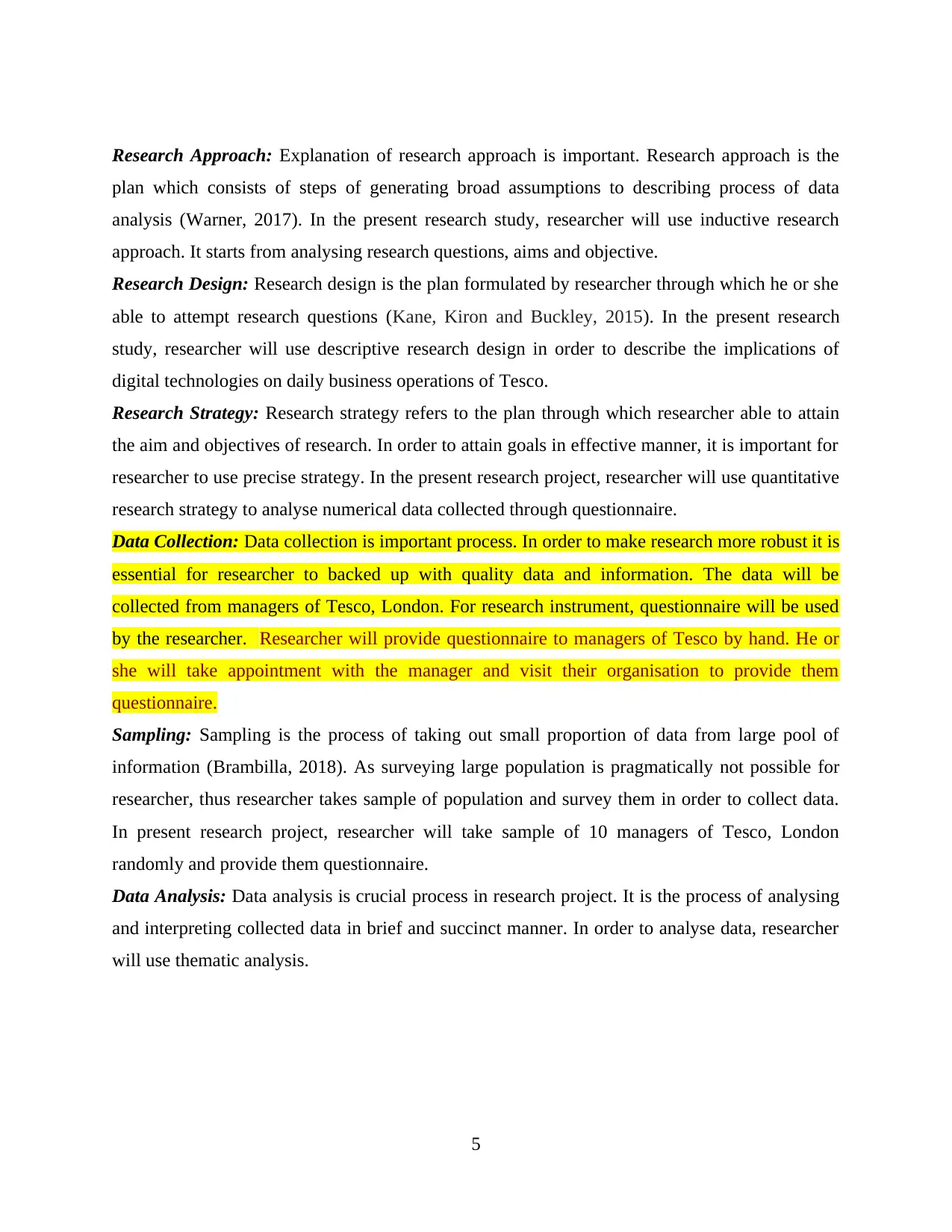
Research Approach: Explanation of research approach is important. Research approach is the
plan which consists of steps of generating broad assumptions to describing process of data
analysis (Warner, 2017). In the present research study, researcher will use inductive research
approach. It starts from analysing research questions, aims and objective.
Research Design: Research design is the plan formulated by researcher through which he or she
able to attempt research questions (Kane, Kiron and Buckley, 2015). In the present research
study, researcher will use descriptive research design in order to describe the implications of
digital technologies on daily business operations of Tesco.
Research Strategy: Research strategy refers to the plan through which researcher able to attain
the aim and objectives of research. In order to attain goals in effective manner, it is important for
researcher to use precise strategy. In the present research project, researcher will use quantitative
research strategy to analyse numerical data collected through questionnaire.
Data Collection: Data collection is important process. In order to make research more robust it is
essential for researcher to backed up with quality data and information. The data will be
collected from managers of Tesco, London. For research instrument, questionnaire will be used
by the researcher. Researcher will provide questionnaire to managers of Tesco by hand. He or
she will take appointment with the manager and visit their organisation to provide them
questionnaire.
Sampling: Sampling is the process of taking out small proportion of data from large pool of
information (Brambilla, 2018). As surveying large population is pragmatically not possible for
researcher, thus researcher takes sample of population and survey them in order to collect data.
In present research project, researcher will take sample of 10 managers of Tesco, London
randomly and provide them questionnaire.
Data Analysis: Data analysis is crucial process in research project. It is the process of analysing
and interpreting collected data in brief and succinct manner. In order to analyse data, researcher
will use thematic analysis.
5
plan which consists of steps of generating broad assumptions to describing process of data
analysis (Warner, 2017). In the present research study, researcher will use inductive research
approach. It starts from analysing research questions, aims and objective.
Research Design: Research design is the plan formulated by researcher through which he or she
able to attempt research questions (Kane, Kiron and Buckley, 2015). In the present research
study, researcher will use descriptive research design in order to describe the implications of
digital technologies on daily business operations of Tesco.
Research Strategy: Research strategy refers to the plan through which researcher able to attain
the aim and objectives of research. In order to attain goals in effective manner, it is important for
researcher to use precise strategy. In the present research project, researcher will use quantitative
research strategy to analyse numerical data collected through questionnaire.
Data Collection: Data collection is important process. In order to make research more robust it is
essential for researcher to backed up with quality data and information. The data will be
collected from managers of Tesco, London. For research instrument, questionnaire will be used
by the researcher. Researcher will provide questionnaire to managers of Tesco by hand. He or
she will take appointment with the manager and visit their organisation to provide them
questionnaire.
Sampling: Sampling is the process of taking out small proportion of data from large pool of
information (Brambilla, 2018). As surveying large population is pragmatically not possible for
researcher, thus researcher takes sample of population and survey them in order to collect data.
In present research project, researcher will take sample of 10 managers of Tesco, London
randomly and provide them questionnaire.
Data Analysis: Data analysis is crucial process in research project. It is the process of analysing
and interpreting collected data in brief and succinct manner. In order to analyse data, researcher
will use thematic analysis.
5
Paraphrase This Document
Need a fresh take? Get an instant paraphrase of this document with our AI Paraphraser
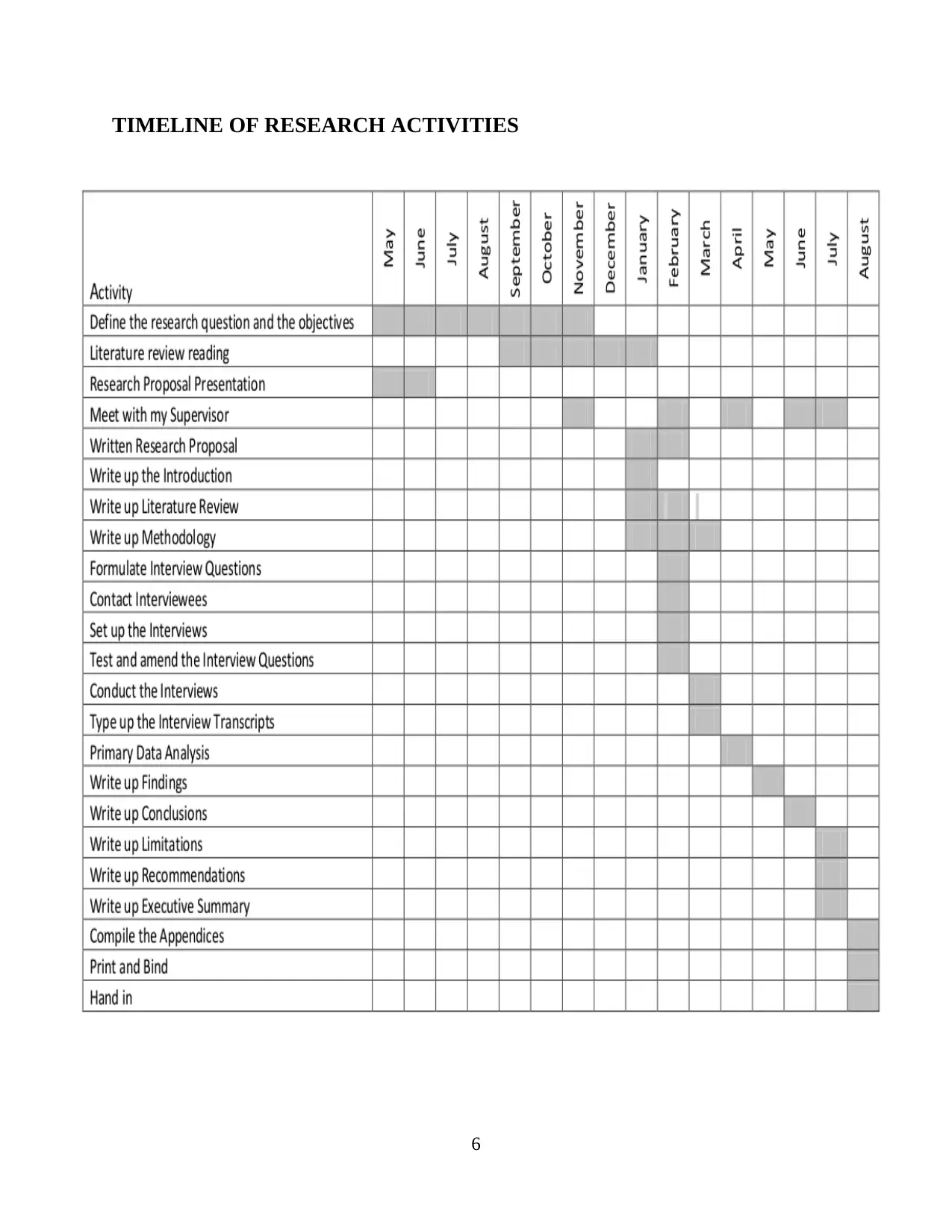
TIMELINE OF RESEARCH ACTIVITIES
6
6

7
⊘ This is a preview!⊘
Do you want full access?
Subscribe today to unlock all pages.

Trusted by 1+ million students worldwide
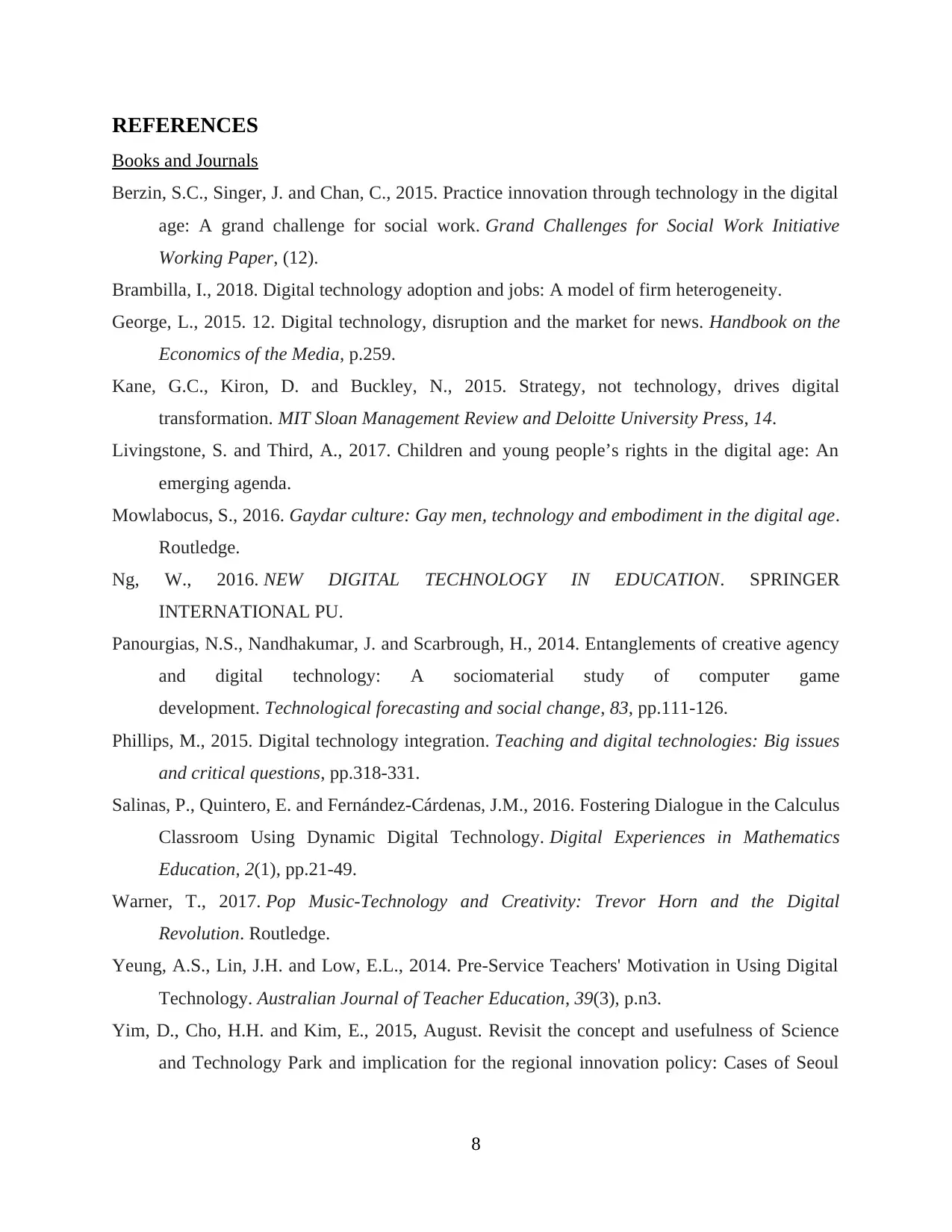
REFERENCES
Books and Journals
Berzin, S.C., Singer, J. and Chan, C., 2015. Practice innovation through technology in the digital
age: A grand challenge for social work. Grand Challenges for Social Work Initiative
Working Paper, (12).
Brambilla, I., 2018. Digital technology adoption and jobs: A model of firm heterogeneity.
George, L., 2015. 12. Digital technology, disruption and the market for news. Handbook on the
Economics of the Media, p.259.
Kane, G.C., Kiron, D. and Buckley, N., 2015. Strategy, not technology, drives digital
transformation. MIT Sloan Management Review and Deloitte University Press, 14.
Livingstone, S. and Third, A., 2017. Children and young people’s rights in the digital age: An
emerging agenda.
Mowlabocus, S., 2016. Gaydar culture: Gay men, technology and embodiment in the digital age.
Routledge.
Ng, W., 2016. NEW DIGITAL TECHNOLOGY IN EDUCATION. SPRINGER
INTERNATIONAL PU.
Panourgias, N.S., Nandhakumar, J. and Scarbrough, H., 2014. Entanglements of creative agency
and digital technology: A sociomaterial study of computer game
development. Technological forecasting and social change, 83, pp.111-126.
Phillips, M., 2015. Digital technology integration. Teaching and digital technologies: Big issues
and critical questions, pp.318-331.
Salinas, P., Quintero, E. and Fernández-Cárdenas, J.M., 2016. Fostering Dialogue in the Calculus
Classroom Using Dynamic Digital Technology. Digital Experiences in Mathematics
Education, 2(1), pp.21-49.
Warner, T., 2017. Pop Music-Technology and Creativity: Trevor Horn and the Digital
Revolution. Routledge.
Yeung, A.S., Lin, J.H. and Low, E.L., 2014. Pre-Service Teachers' Motivation in Using Digital
Technology. Australian Journal of Teacher Education, 39(3), p.n3.
Yim, D., Cho, H.H. and Kim, E., 2015, August. Revisit the concept and usefulness of Science
and Technology Park and implication for the regional innovation policy: Cases of Seoul
8
Books and Journals
Berzin, S.C., Singer, J. and Chan, C., 2015. Practice innovation through technology in the digital
age: A grand challenge for social work. Grand Challenges for Social Work Initiative
Working Paper, (12).
Brambilla, I., 2018. Digital technology adoption and jobs: A model of firm heterogeneity.
George, L., 2015. 12. Digital technology, disruption and the market for news. Handbook on the
Economics of the Media, p.259.
Kane, G.C., Kiron, D. and Buckley, N., 2015. Strategy, not technology, drives digital
transformation. MIT Sloan Management Review and Deloitte University Press, 14.
Livingstone, S. and Third, A., 2017. Children and young people’s rights in the digital age: An
emerging agenda.
Mowlabocus, S., 2016. Gaydar culture: Gay men, technology and embodiment in the digital age.
Routledge.
Ng, W., 2016. NEW DIGITAL TECHNOLOGY IN EDUCATION. SPRINGER
INTERNATIONAL PU.
Panourgias, N.S., Nandhakumar, J. and Scarbrough, H., 2014. Entanglements of creative agency
and digital technology: A sociomaterial study of computer game
development. Technological forecasting and social change, 83, pp.111-126.
Phillips, M., 2015. Digital technology integration. Teaching and digital technologies: Big issues
and critical questions, pp.318-331.
Salinas, P., Quintero, E. and Fernández-Cárdenas, J.M., 2016. Fostering Dialogue in the Calculus
Classroom Using Dynamic Digital Technology. Digital Experiences in Mathematics
Education, 2(1), pp.21-49.
Warner, T., 2017. Pop Music-Technology and Creativity: Trevor Horn and the Digital
Revolution. Routledge.
Yeung, A.S., Lin, J.H. and Low, E.L., 2014. Pre-Service Teachers' Motivation in Using Digital
Technology. Australian Journal of Teacher Education, 39(3), p.n3.
Yim, D., Cho, H.H. and Kim, E., 2015, August. Revisit the concept and usefulness of Science
and Technology Park and implication for the regional innovation policy: Cases of Seoul
8
Paraphrase This Document
Need a fresh take? Get an instant paraphrase of this document with our AI Paraphraser
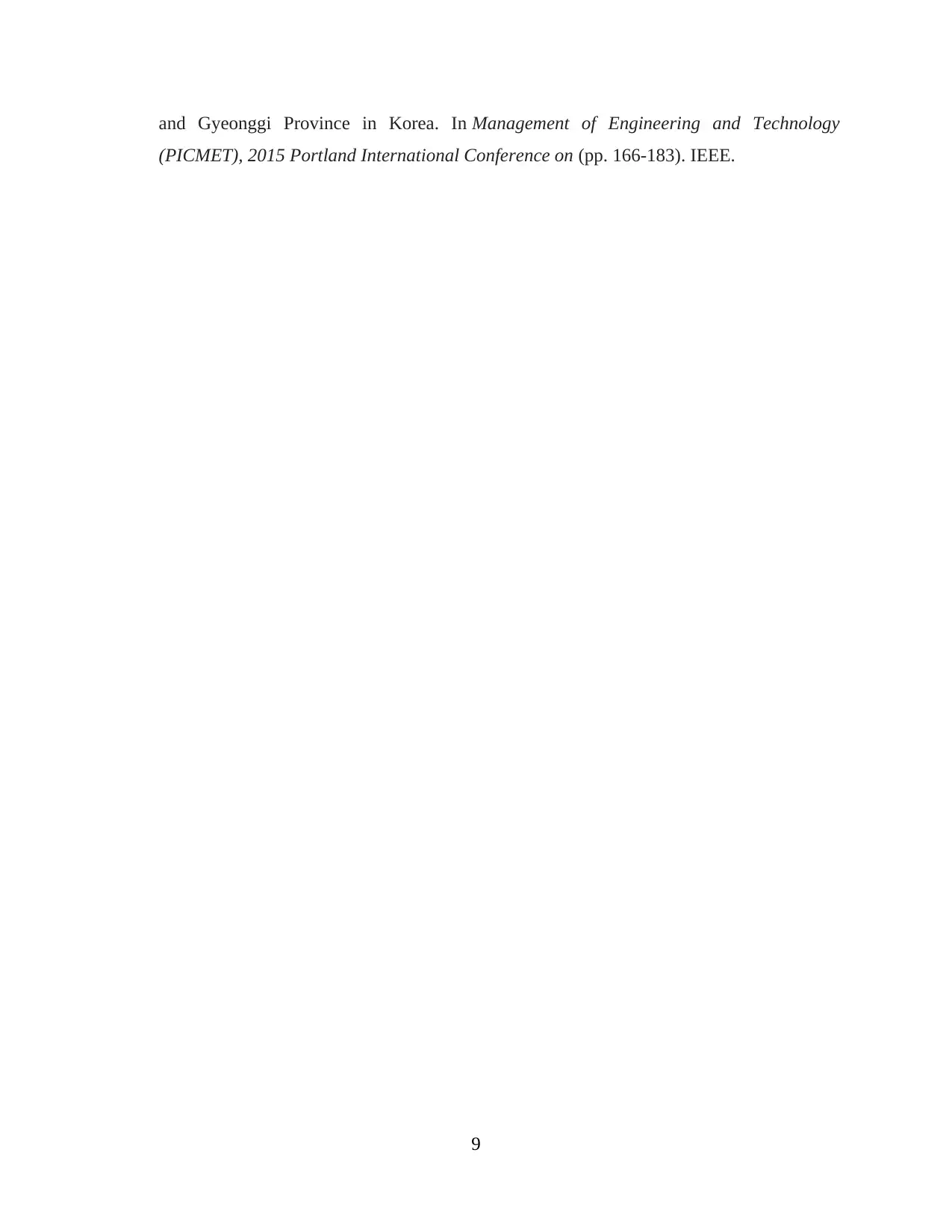
and Gyeonggi Province in Korea. In Management of Engineering and Technology
(PICMET), 2015 Portland International Conference on (pp. 166-183). IEEE.
9
(PICMET), 2015 Portland International Conference on (pp. 166-183). IEEE.
9
1 out of 11
Related Documents
Your All-in-One AI-Powered Toolkit for Academic Success.
+13062052269
info@desklib.com
Available 24*7 on WhatsApp / Email
![[object Object]](/_next/static/media/star-bottom.7253800d.svg)
Unlock your academic potential
Copyright © 2020–2026 A2Z Services. All Rights Reserved. Developed and managed by ZUCOL.





